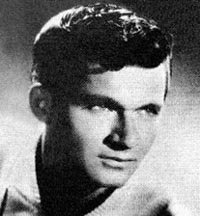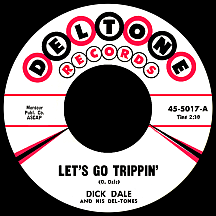DICK DALE AND HIS
DEL-TONES
Let's Go Trippin'
"King of the Surf Guitar" is a title that describes a particular axe-annihilating surfer who marked his turf on the California coast more than a half-century ago. It proved to be an accurate, though not very detailed, description of swashbuckling multi-instrumentalist Dick Dale. He outshined other six-string contenders with ease; his is the first name uttered when the subject is broached among those in the know. Technique, innovation, execution. Check, check, check. Yet despite making an explosive early-'60s splash throughout Southern California and the rest of the west coast, he was little more than a blip on the undersea radar as far as the rest of the world was concerned.
From his Boston birthplace in 1937 to Orange County some two decades later, Dale released his first single on his own label, Del-Tone. "Ooh-Whee-Marie," a rock and roller with stuttering vocals, made for an impressive debut in 1959; had it caught on, his career might have taken an entirely different path. The next couple of singles, including an even hotter rocker, "Jessie Pearl," were a couple of years removed from the teen-oriented trends of 1960. He softened his sound considerably with "We'll Never Hear the End of It" on the Cupid label, but it wasn't a good fit for the rockabilly-inspired singer. In 1961 he and his band The Del-Tones started performing on a regular basis at the Rendezvous Ballroom on Balboa Island near Newport Beach; one of the country's largest night spots, it could easily hold three thousand or more patrons at one time and was a frequent stomping ground for some of the hottest bands of the '30s and '40s as well as the site of some high-profile marathon dance competitions. By the early '60s interest in the venue was fading, but Dale 's presence turned things around; word got out that something wild was going on at the Rendezvous.
Deltone Records (minus the dash) released Dick and the Del-Tones' "Let's Go Trippin'," often cited as the first surf record, in the fall of 1961. Similar surf-style instrumentals existed as far back as 1958 but hadn't been identified as such (among them "Crossfire" by Johnny and the Hurricanes, "Bulldog" by The Fireballs, "Moon Dawg!" by The Gamblers, "Walk - Don't Run" by The Ventures and some of Link Wray's early recordings). But "Trippin'" was the song that sparked the new wave. Dale produced the record himself (under his real name, Richard Monsour) and composed the song, a sliding, fast-pickin' guitar-and-sax tune that quickly picked up airplay at SoCal radio outlets and hit the top ten on Los Angeles stations KRLA and KFWB in November. Nationally it was a minor hit, reaching number 60 on Billboard's charts in January '62. The Mar-Kets' "Surfer's Stomp" came on its heels, then in early '62 The Beach Boys appeared with the first surf hit containing lyrics, logically titled "Surfin."
Dale's approach to guitar playing was extremely difficult to imitate. He played left-handed but didn't reverse the strings, a double-backwards technique that he alone mastered; no random musician would have been able to pick up his Stratocaster and do it justice. Onstage he demonstrated the ability to play left- or right-handed, upside down or behind his back! Leo Fender was impressed at how he handled the instrument, watching in amazement as he blew out amplifiers at a steady clip. Fender developed the Showman Reverb amp to accommodate Dick's extreme style; with increased volume capability, it was designed to take a beating. He used it to achieve a "wet" sound that, when coupled with the double-picking technique heard on many of his recordings, is considered the authoritative surf guitar sound many musicians sought to achieve.

Surprisingly, there was minimal reaction beyond the Rendezvous to the follow-up single, "Shake-N-Stomp." Next came "Miserlou," a Greek folk song from the 1920s (originally "Misirlou," the correct spelling appeared on later pressings of the single). Popular in Eastern Culture, it was this maxed-out rock remake that used the bubbling sound of Dale's upside-down axe work to great advantage. Released in the spring of '62 it didn't catch on right away, but after several months in limbo became a huge hit in Los Angeles, topping local charts in December. Despite its regional dominance (top ten in all five major west coast U.S. cities), the record somehow failed to appear on any national chart. "Peppermint Man," Dick's first vocal recording in a few years (its title referring to the striped shirts worn by many surfers including the Beach Boys as evidenced on record covers and in concert), it joined "Miserlou" in the L.A. top ten in early '63 while its flip side, the scorching "Surf Beat" (with Dick playing guitar and sax) also benefited from strong airplay. The whole time this Southern California phenomenon was happening, the majority of the nation's population went about their daily lives unaware. Surf music reached its zenith in 1963, but Dick Dale and his Del-Tones weren't a part of it in many locations east of California, Oregon and Washington.
Still, inside the L.A. fishbowl, Dick was red hot and suddenly highly sought after by major record companies. Within weeks he had signed a contract with L.A.'s Capitol Records. First came the recording made to match the nickname, "King of the Surf Guitar" (with vocals by The Blossoms), backed by a revved-up version of the traditional Jewish tune "Hava Nagila," further illustrating Dick's fascination with Middle Eastern melodies (a result of his Lebanese and Polish heritage). The band appeared in the low budget boxing film A Swingin' Affair (performing "Miserlou" and the fim's instrumental theme), followed in the summer by Beach Party, one of 1963's top-grossing box office hits and the first of many Frankie Avalon-Annette Funicello vacation-themed teen romps. The movie's success guaranteed exposure outside the west coast, though the two songs the group performed ("Secret Surfin' Spot" and "Surfin' and A-Swingin'," both vocals) didn't adequately represent the real sound Dick was layin' down. He signed on for more fun with Frankie and Annette (and Little Stevie Wonder) in the '64 spring break theatrical release Muscle Beach Party.
Dick and his Del-Tones remained with Capitol for the next couple of years. "The Scavenger," a vocal hot rod song ('...it's bad, it's bad, it's bad-bad-bad!'), sneaked onto the national chart for one week in October '63 and instrumental "The Wedge" (named after a popular surfing spot in Newport Beach) gave him one last blast of airplay in L.A. in early '64. Later in the decade he made records for the Cougar and Accent labels after a scary diagnosis of colon cancer; it sidelined him for awhile but didn't do him in. He continued crankin' the volume in concert on a steady basis and returned to the silver screen, reuniting with Frankie and Annette in the 1987 hit Back to the Beach, where he teamed with Stevie Ray Vaughan on a mind-boggling version of The Chantays' 1963 surf standard "Pipeline," receiving a Grammy nomination for his effort. Soon-to-be superstar director Quentin Tarantino (one of those in the aforementioned know) slapped "Miserlou" over the opening credits of his game-changing 1994 film Pulp Fiction. The soundtrack sold millions; the song seemed to be everywhere and was at last the widespread smash it had deserved to be three decades earlier, as Dick Dale permanently solidified his long-established position as "King of the Surf Guitar."


